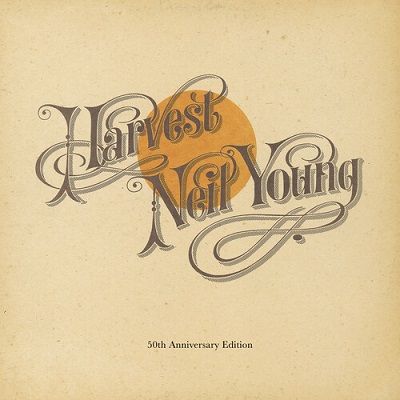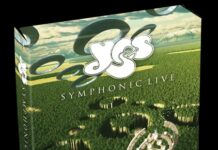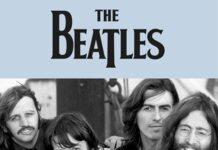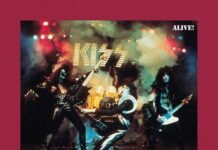Even with over 40 studio albums under his belt (and likely more to come), Neil Young can’t deny that his fourth, the beloved Harvest, might be one of his best. Recorded at a time when the singer (then, also, one-quarter of CSNY) was at his most fertile, a “rich hippy” working with top-notch musicians, bursting with creative ideas, confident and steadfast in how his music should sound and resonate. It was — as Young so eloquently says while nursing a Coors and laying in a field in a newly released documentary, Harvest Time — “a weird time…an incredible time.” That and a 50th Anniversary Edition of Harvest help put it all in perspective.
For a pure insider’s view of how Harvest was recorded, Harvest Time is about as close and intimate as you can get. Intended to be a full-feature film at the time of its making, the two-hour documentary follows Young in sessions at his Broken Arrow Ranch barn with the Stray Gators to London to record with the London Symphony Orchestra, then over to Nashville to cut more tracks. Watching Young dig in with Jack Nitzsche (piano), Ben Keith (steel guitar), Tim Drummond (bass) and Kenny Buttrey (drums) is really at the center of the action. Nitzsche, a seasoned musician and arranger who had previously worked with Phil Spector and the Rolling Stones, is especially pivotal to the sessions. Young looks to him to help keep it all together at the ranch and in London.
Harvest Time also features some incredible segments of Young recording background vocals with David Crosby and Stephen Stills during one session, and the same with Graham Nash and Stephen Stills during a second session. It’s fascinating to watch Crosby, Stills and Nash all work under Young, who seems to thrive on directing, as well as being playful and amicable, with the others. To this day, CSN knows the additional Y is the difference between theaters and arenas, though the chances of that ever happening again are slim to none. Harvest Time reminds us there was a moment in Neil Young’s world when anything was possible.
The 50th Anniversary Edition of Harvest includes Harvest Time on DVD, along with a second DVD of an unreleased solo BBC concert recorded on February 23, 1971. CDs or LPs of that performance, Harvest outtakes (“Bad Fog Of Loneliness,” “Journey Through The Past,” and “Dance Dance Dance”) and the original album, plus a hardbound book with exclusive photos and liner notes and fold-out poster, complete the set.
When he got around to making Harvest in 1972, Neil Young had already experienced the highs and lows of stardom with Buffalo Springfield and CSNY. The enticement didn’t exactly float his boat; rather, it inspired him to reach down within himself and write even more personal songs. Eventually, he ended up in Nashville, bumped into James Taylor and Linda Ronstadt, and decided to round up some local musicians for a few sessions. With CSNY on hold and Crazy Horse waiting in the wings, Young put an impromptu band together with Drummond, Buttrey, Keith and Nitzsche. They called themselves the Stray Gators. They would be the core musicians on what was to become Harvest.
Even as Young invited Crosby, Stills, and Nash to lend a hand on the new album, the singer-songwriter was suffering from a bout of inner turmoil. Most of the songs on Harvest transcend any number of distressing themes — loneliness, loss, despair and longing. The title track may find Young singing “let me fill your cup with the promise of a man,” but the mood shifts suddenly with “A Man Needs A Maid.” Here, Young, who once declared he belonged to no one but himself, evokes some odd strain of emotional detachment from the woman he loves — in this case, his girlfriend at the time, actress Carrie Snodgress — with role-playing and meandering inadequacy. Young’s first and only number one single, “Heart Of Gold,” is yet another plea for redemption. With Taylor and Ronstadt singing backup, it’s certainly a convincing appeal.
With Ben Keith’s pedal steel gliding alongside the chorus, “Old Man” is a tender melody about a young man pondering over his own mortality. Recorded live at UCLA’s Royce Hall, “The Needle And The Damage” is frank and direct — a sordid overview of a junkie’s wasted life, as it pertains to the heroin overdose of Danny Whitten, the late guitarist and vocalist for Crazy Horse. Somehow, Young’s voice rises above the din, and delivers a chilling vocal. While Harvest veers off course with an occasional over orchestrated misfire like “There’s A World,” it more often rebounds with a classic rant like “Alabama,” a torrential downpour in the “Southern Man” vein. Critics of the day dissed it as a sell-out; today, 50 years later, Harvest continues to stir and influence its way into the hearts and minds of ensuing generations.
~ Shawn Perry




















